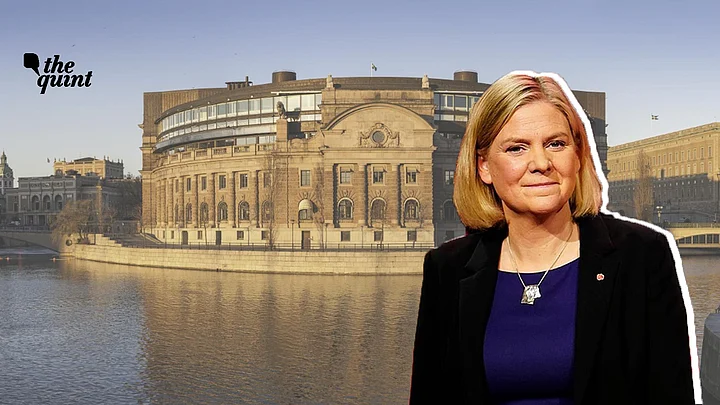Magdalena Andersson of the Swedish Social Democratic Party (S/SAP) became the prime minister of Sweden on Monday, 29 November, for the second time in less than a week, Reuters reported.
Andersson, who is 54 years old and an economist, was initially named prime minister last week on 24 November, but resigned just a few hours later after the Swedish Parliament – the Riksdag – refused to support her budget for the year 2022, and instead supported the Opposition coalition's spending plan.
Her resignation also came as a response to the Green Party, which is allied to the S/SAP, pulling out of the governing coalition due to disagreements with the Opposition budget.
Let's take a look at all of this in a little more detail.
Peculiar Rules of Sweden's Parliament
The prime minister in Sweden is elected a little differently compared to other countries that also have parliamentary systems.
Essentially, the Swedish PM is elected by a process of what is known as 'negative parliamentarism,' which means that the nominated candidate needs fewer than the majority number of MPs to vote 'no', while the number of 'yes' votes and abstentions don't really matter.
A majority in the Riksdag, which has 349 seats, requires 175 votes, which means 174 or fewer MPs vote 'no' for the nominee, they go on to become the prime minister.
When the Swedish Parliament voted for Andersson on 24 November, she was able to avoid 175 'no' votes by the smallest of margins. These were the final votes, according to the Swedish Parliament's website:
Yes: 117
No: 174
Abstain: 57
Absent: 1
The Coalition Structure
The latest Swedish elections were held in 2018 in which the S/SAP led by Stefan Löfven emerged as the single largest party. Löfven then became the prime minister and Andersson served as the Minister of Finance.
But in August 2021, Löfven retired from the leadership of the Social Democrats and resigned as the PM. Andersson succeeded him in becoming the leader of the S/SAP, and had to be confirmed by the Riksdag as the next prime minister of Sweden.
Currently, the Riksdag consists of the left-leaning governing coalition comprising the S/SAP, the Centre Party, the Left Party, the Green Party and one independent member.
The opposition coalition, which is a hybrid of liberal-conservative and populist parties consists of the Moderate Party, the Liberal People's Party, the Christian Democrats and the far-right Eurosceptic Swedish Democrats.
Now that we are familiar with the basic structure and functioning of the Riksdag, what were the events that led to Andersson's resignation?
Disagreements Over the 2022 Budget
The 2022 budget proposed by Andersson lies at the heart of the dramatic events that Sweden is witnessing.
The budget that was drafted by her was rejected by the Parliament, which instead supported a spending plan that was formulated by her political rivals – the Moderate Party, Christian Democrats, and the Swedish Democrats.
Consequently, the Green Party, which is part of the governing coalition, quit the government since the newly accepted budget did not contain enough policy provisions of its own, and that it also refused to accept a budget that was in part penned by the Swedish Democrats (due to their far-right and populist nature).
Therefore, Andersson resigned, justifying her decision by stating that "there is a constitutional practice that a coalition government should resign when one party quits," BBC reported.
"I don't want to lead a government whose legitimacy will be questioned," she added.
Anderrson's initial budget was apparently "too left" for even her own coalition party's desires.
Annie Lööf, the leader of the Center Party (allied to S/SAP), said that her party "can’t support a budget which moves so far to the left," Politico reported.
But after last week's political tussle, Magdalena Andersson's new budget, which reduces taxes but pays higher salaries to police officers at the same time, was accepted by the Parliament as she became prime minster for the second time in a week thanks to a new vote on 29 November.
This time around, 173 Swedish lawmakers voted 'no' for her to become prime minister, but since it was two short of 175, she was reinstated to the top post.
When asked about how she feels with respect to governing with a budget that was drafted by the Opposition, Andersson said that "someone has to be prime minister in this country, and it seems like there is no other alternative," as quoted by the Swedish newspaper Dagens Nyheter.
Andersson, who reportedly wants to remain prime minister for the next decade, will now not just lead the government, but also her party during Sweden's general elections that are scheduled to be take place in September next year.
A Milestone in Swedish Politics
Despite being one of Europe's most progressive countries, especially with respect to gender issues, Andersson’s appointment as prime minister is a landmark moment for Sweden.
Until now, Sweden was the only Nordic country to not have had a female prime minister.
Both Denmark, whose prime minister is Mette Frederiksen, and Finland, whose prime minister is Sanna Marin, currently have women leading the countries.
Gro Harlem Brundtland served three terms as the 29th Norwegian prime minister while Iceland also made history by electing Johanna Sigurdardottir as its first female prime minister in 2009.
Andersson's appointment, therefore, is a huge moment for Sweden.
Even the Center Party leader Annie Loof, who rejected the prime minister's first budget, told the Riksdag that a female prime minister "means a lot to many girls and women, to see this glass ceiling shattered. I am proud that [the Center Party] is involved and makes this possible," as quoted by ABC News.
(With inputs from Dagens Nyheter, ABC, BBC, Politico, and Reuters.)
